Get Angry Then Get Free: The Political Necessity of Rioting in Dismantling the System
by Joshua Virasami
6 June 2020
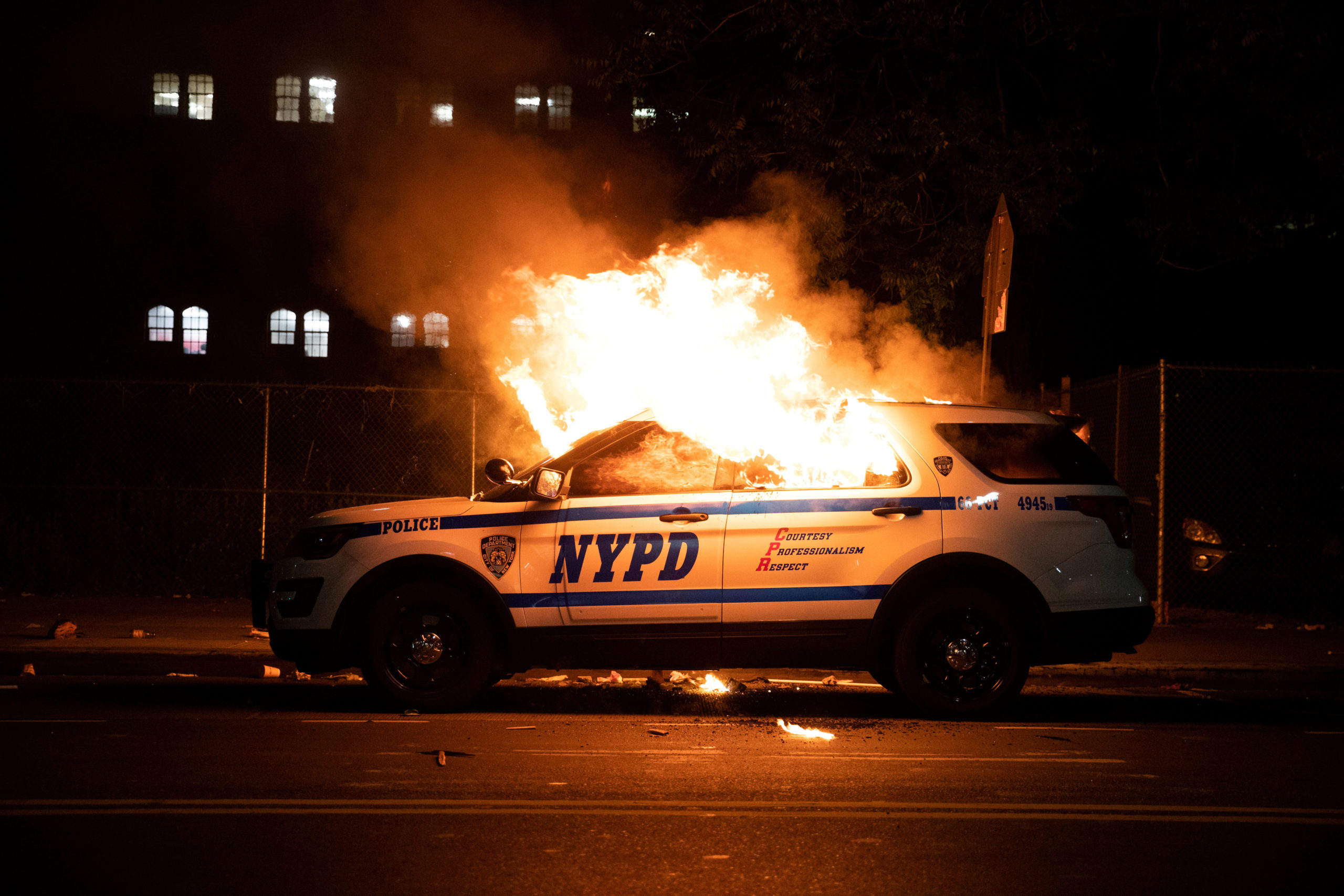
“I cannot be an optimist but I am a prisoner of hope,” declares philosopher and revolutionary Cornel West. His speech on CNN in response to the George Floyd uprising is life-support in these harrowing but revolutionary times, where working people across the world are forced to endure the insufferable tyranny of a global downturn, a mishandled pandemic and increased state violence.
As an anti-racist activist organising with Black Lives Matter UK, I am always expecting tragedy – the names and stories of those brutalised and killed at the hands of the police permanently etched into my mind. But no matter how much you are expecting it, nothing can prepare you for – or alleviate the pain and trauma – when it happens again. It tears at the seams of the spirit.
The cycle of murder-protest-further state violence-climbdown has become a painfully familiar part of life for the #BlackLivesMatter generation. Novelist raised a placard in 2016, John Boyega lifted a megaphone this week. But that’s not the whole story.
The ferocity of mobilisation this time shows us not only that tensions are running high in global lockdown, but also speaks to the ubiquitous power of Black Lives Matter as a slogan, culture and movement. 17-year-old hero Darnella Frazier knew exactly what she had to do when she witnessed the police killing of George Floyd: phone, upload, hashtag.
“How are the George Floyd protests connected to the UK?”
Nearly every journalist we’ve fielded over the past few days has asked some version of this question.
But when the British government tried – and failed – to sit on a still partly censored public health report, which reveals the disproportionate effects of Covid-19 on black, Asian and minority ethnic people, allegedly for fear of stoking tensions at the time of George Floyd protests, that connection is made glaringly obvious.
Racism knows no geographic bounds: the system is failing and killing poor black and brown people not just in the US but everywhere.
Many of us know police and state violence intimately; we live in or come from communities with a constant knee on its neck; one that bears no promise of letting up. Collective grief at police violence here in Britain, or France, or India, where friends are currently being detained for their political organising, is processed in bits and pieces; on the web or in fleeting conversation. I find it hard at times to be an optimist, but I look to the past, to the future, and see the power of will and I have hope.
I’m hopeful because the promising part of this repeating episode is the resistance that comes from it. In the resistance, we are not just vindicated, but offered visions of the freer world, chanted in full volume and splayed across placards: defund the police (the NYPD raises a gross $5bn annual budget – where could this go instead?), abolish it entirely.
View this post on Instagram
Hope is the tens of thousands of people, young and old, who are introduced to political struggle in moments of crisis such as these. People who will bear witness to or experience state violence; people who will hunger for explanations for injustice and methods to achieve freedom; people who may become the revolutionaries the world so desperately needs.
“America is sick.”
My good friend and one of the co-founders of Black Lives Matter messaged me from LA: “America is sick”.
The United States is in the ICU. To work our way out of the violence so endemic to racial capitalism and to honour the racist murders of George Floyd, Breonna Taylor, Tony McDade and the countless others who have been killed by the police, we must first understand the global systems of oppression that enable such violence to be enacted.
And then we must strategise and fight – by any means necessary – to dismantle them. As West so aptly put it in his CNN speech: “try again, fail again and fail better”. Political struggle can leap five years in five days, such is its nature. What lies around the corner of tomorrow is unknowable; what is knowable are our solidarities and strategies.
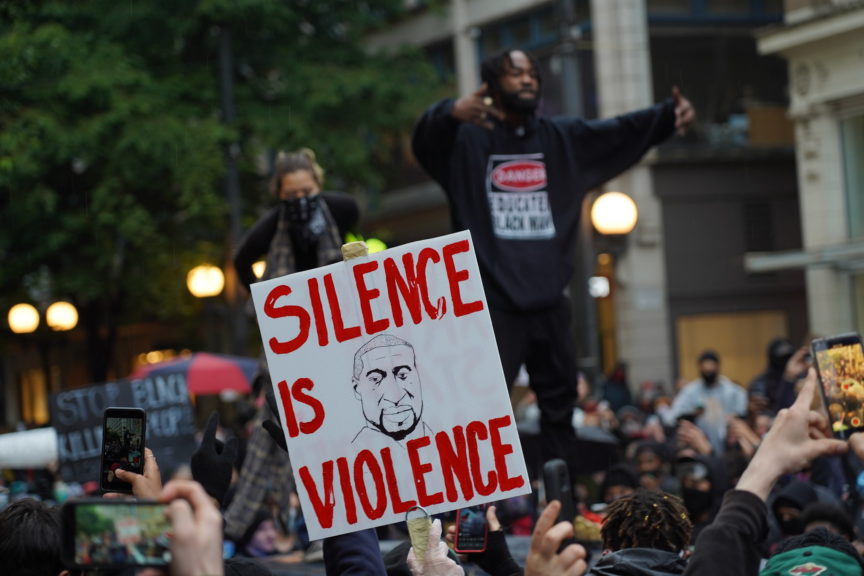
This is America.
To be poor and black in America is to live a life underscored and shaped by intersecting violences. Instances of police brutality act as tipping points, but the everyday violence of capitalism, an economic system built on the exploitation of black and brown people, is what pushes them toward the edge. Racial capitalism structures American society and fuels the racism which continues to shock the world. To fight racism then is also to fight capitalism and all the injustices bound up within it.
Childish Gambino won four Grammys for his song This is America in 2018. Hundreds of millions of views later, his scathing satire is etched into our minds. The message: police brutality, mass shootings, rampant materialism; this is the real America – not the ‘dream’ that was promised, but a nightmare.
Floyd entered a deli on 25 May 2020, allegedly using a counterfeit $20 bill to purchase groceries. Eric Garner walked along a hot summer sidewalk in Staten Island on 17 July 2014, selling cigarettes, allegedly without tax stamps to do so. Philando Castile started his 1997 white Oldsmobile on 6 July 2016 and drove down the freeway, with a busted taillight. The stories are unnaturally familiar by now, their video counterparts haunting us like pixelated ghosts.
Floyd was strangled to death for nearly nine minutes by officer Derek Chauvin, five minutes of which were literal overkill. On twelve occasions Floyd told Chauvin he could not breathe; Eric Garner, eleven. Floyd’s final words were: “I’m about to die, don’t kill me.”
On 16 occasions, bystanders told officers to check his pulse, a medic even identified herself. Instead, for another five minutes, Chauvin kept his knee firmly in Floyd’s neck.
Chauvin, who has at least twelve police brutality complaints against him, is implicated in the shooting of Wayne Reyes and Leroy Martinez, a Latino and Indian-American respectively. Chauvin is a recipient of a ‘medal of valour’ for his bravery on the beat. He is now represented by lawyer Tom Kelly, who had officer Jeronimo Yanez acquitted of murdering Philando Castile in his car.
Chauvin is the face of American terrorism and this murder another notch in the centuries-long tally of the extra-judicial murder of poor black and brown people. George Floyd is not the only name being pulled from the gore of American jungle of justice. Aubrey Jones, Breonna Taylor, Tony McDade – these names recall some of the other equally horrifying accounts of police killings in recent months.
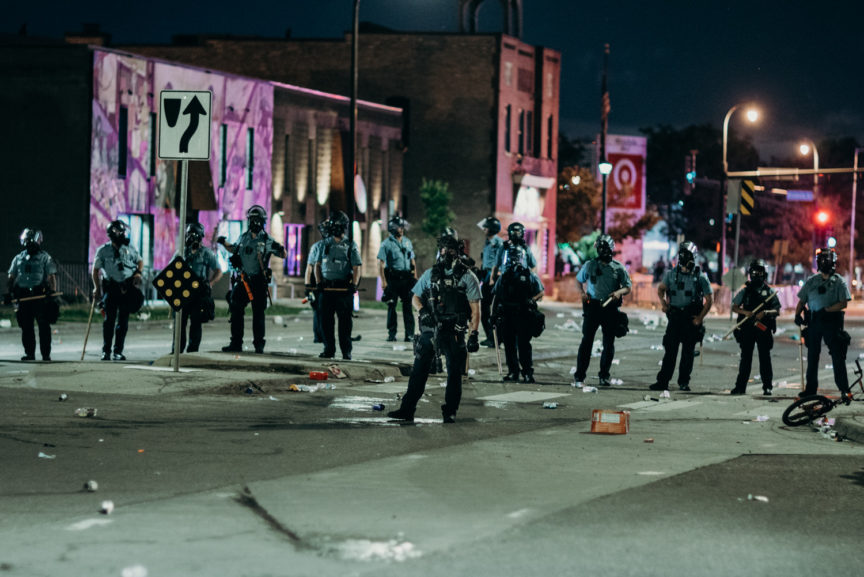
“From slave to criminal in one amendment.”
Police violence scholar and activist Angela Davis notes: “There is an unbroken line… that takes us all the way back to the days of slavery”. The constant threat and administering of bloody, murderous violence was the primary method to keep enslaved black labourers compliant and for their labour power to be expropriated without a wage. This violent slave-making economy powered the rise of American capitalism. But the violence itself never disappeared, it has only transformed.
The Louisiana state penitentiary, the largest maximum security prison in America (the size of Manhattan or Leicester) is colloquially known as Angola prison. Built on the land of the Angola Plantation, it was named after the country from where most slaves had arrived, and convict-leasing turned hoards of African-American men toward penal labour. Prior to that it was simply four plantations, where slaves toiled the cotton plants. “From slave to criminal in one amendment” was how Ava DuVernay so aptly put it in her seminal documentary 13th.
White supremacist capitalist violence has many spiritual homes. One of them is fittingly called ‘the White House’. Following two nights of urban unrest, president Donald Trump made an inflammatory statement ending with the words of Walter Headley: “When the looting starts, the shooting starts.”
Headley is the archetypal Southern police chief of 1969, the kind of man who would brag that his white officers were “policemen” whilst the blacks were “patrolmen”. His directive of shooting to kill did in fact lead to three police killings in the black community during the Miami riots, which started in response to the election of Richard Nixon.
Headley himself is said to have borrowed the phrase from Bull Connor, a notorious Southern segregationist politician who set attack dogs and fire hoses on poor black people, whilst rallying white extremists to bomb them. The 16th Street Baptist Church Bombing is but one example of this reign of terror.
In a verse on XXX, which appears on the album DAMN, Kendrick Lamar aptly articulates this American nightmare:
It’s murder on my street, your street, back streets
Wall Street, corporate offices
Banks, employees, and bosses with
Homicidal thoughts; Donald Trump’s in office
Violence is the bedrock of working class black life in American society. The gross disproportionality in the impacts of the coronavirus crisis, the housing crisis, the rigged criminal justice system or the fact that black women, who are the main providers for 80% of black families, earn on average $34,000 to the white man’s $53,000 – these are the daily reminders that poor black and brown Americans are a subordinate class.
It is on this continued exploitation and humiliation that Martin Luther King ends his famous quote on the urban riot: “I think that we’ve got to see that a riot is the language of the unheard. And, what is it that America has failed to hear? It has failed to hear that the economic plight of the Negro poor has worsened over the last few years.”
Riot, strike and resist.
For as long as we have been exploited by racial capitalism, we have rebelled against it. There is a long history of black and brown communities using the riot as a tactic, alongside industrial action and nonviolent demonstrations, to lever serious political change. We must situate the riot as a legitimate and necessarily violent form of protest in the struggle for freedom within racial capitalism.
Historian Howard Zinn once remarked that you cannot be neutral on a moving train. British society is broken, it is a speeding train hurtling through Grenfell, through coronavirus, through a brutal landscape of unending injustices.
When an end to that neutrality is demanded of third parties (by which I mean white people), like clockwork, the liberal hymn sheet is passed around the choir. It goes something like this: yes this is an injustice, yes this is racist, yes cops should be tried, but no riots are never justified and no we should not abolish police and prisons.
But when peaceful protestors themselves cannot breathe through the teargas – when they are gunned down in the street by vigilantes – they will, if not through the sheer human will to survive, protest violently. As Novara’s James Butler puts it: “Broken windows are a profoundly rational response – maybe the only really rational response – to so broken a society.”
The irony, of course, is that an event like the Boston Tea Party – centred as it is around an act of vandalism and destruction of property – is so widely celebrated.
‘Until the lions have their own historians, the history of the hunt will always glorify the hunter.’
Taught on perhaps every school syllabus in America, the events of the Boston Tea Party, which took place in 1773, saw a group of American colonists, angry over Britain’s decision to increase tax prices on tea, board three ships loaded with British tea (which the British had, in turn, looted from China), and proceed to spend four hours looting, pouring over 90,000 pounds of tea into the Boston Harbour. In the event that they got caught, some of the group allegedly dressed as Native Americans, so that they had a scapegoat.
Today, these men, who destroyed millions of pounds worth of property, all in the name of cheap tea, are lauded as heroes and patriots. Meanwhile, those who have taken to the streets, in Minneapolis and beyond, to protest the routine institutional murder of black and brown people – setting on fire a police station and smashing some shop fronts along the way – are being demonised for their actions.
Look at these thugs rioting! Destroying a boat and dumping the contents into the water….. Oh wait that’s just the Boston tea party. A symbol of patriotism and something this country was built upon pic.twitter.com/npliODeCEd
— Damion Reed Jr (@_dreed32) June 2, 2020
America was founded upon acts of vandalism and property destruction, but it’s who’s doing that destruction that ultimately determines how it will be seen – whether it will be demonised or revered. As novelist and historian Chinua Achebe explains: “Until the lions have their own historians, the history of the hunt will always glorify the hunter.”
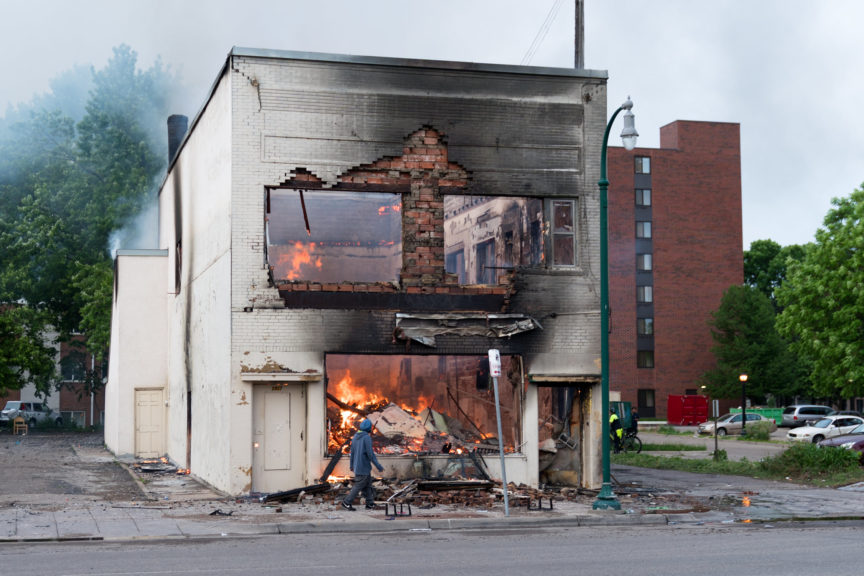
The civil rights struggle is lauded as the prime example of gains being won off the back of nonviolent civil disobedience. Similarly, successive political movements have spoken of Gandhi as the exemplary nonviolent protestor, whose reward was independence from British colonial rule. It’s a powerful myth; the virtue of nonviolence and the vice of violent tactics – but it is a fallacy.
Armed black paramilitary and self-defence organisations in the US South are arguably a foundation and cornerstone of the civil rights movements who later – in part – deferred to nonviolence.
As Akinyele Umoja writes in We Will Shoot Back, these armed movements not only saved lives, they also reduced the efficiency of white terrorism in the Jim Crow South. Were it not for the military expeditions of Harriet Tubman, with platoons of black unionist soldiers, she would not have freed 750 slaves in the Combahee River Raid.
The success of countless iconic freedom struggles is inextricable from the direct or indirect threat of violent protest, often in the form of riots and looting.
The Civil Right Bill of 1964, journalist Ta-Nehisi Coates writes,“is inseparable from the threat of riots. The housing bill of 1968 – the most proactive civil-rights legislation on the books – is a direct response to the riots that swept American cities after King was killed. Violence, lingering on the outside, often backed nonviolence during the civil-rights movement”.
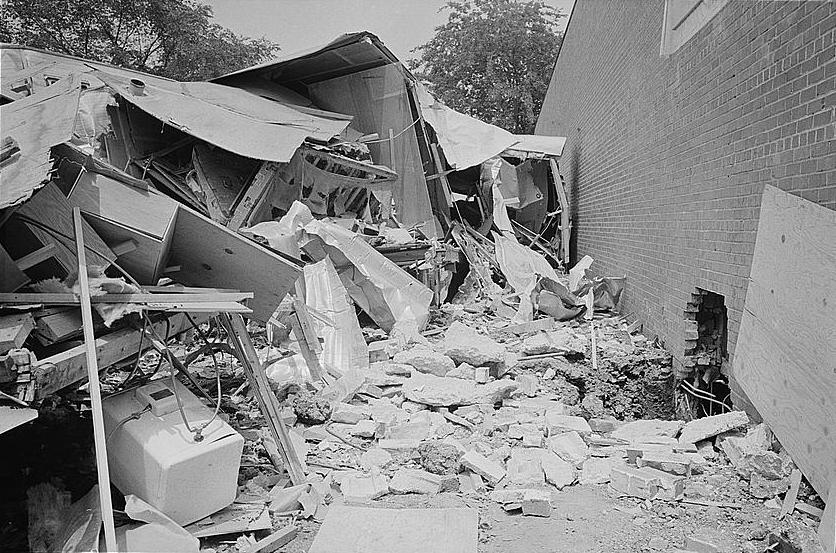
The same is true of revolutionary socialist Bhagat Singh and others, whose armed insurgencies played an accompanying role with the nonviolence of Gandhi.
Riots can seem senseless, for anyone who hasn’t been driven to it at least, but they are also a re-sensitisation of black and brown communities to the substandard quality of life we find ourselves in, and thus an acutely political response. Take rapper The Game’s lyrics from the song Savage Lifestyle, on his album 1992. On this album, but particularly in this song The Game recounts the LA riots of 1992, from the viewpoint of the community:
So grab that gun, load that clip
Grab that torch, light that shit, grab that stick
Grab that brick, throw it. it’s time to riot
If you don’t see black-owned in the window, it’s on fire
Start here, end up over there
The smell of gunpowder in the air
And just so we clear, this is pain and despair
We burn our own shit and we aware and don’t care
Tell the national guards to disappear
We got guns too and we ain’t scared
So fuck the man, fuck the President Bush and his legislation
Shit gotta change, we ain’t waitin’, fuck patience
‘Cause the government corrupt, I can prove it
Martin, Malcolm, Huey P. Newton
And that’s why the whole city out here lootin’
How can we stand here and not do shit?
Understood in this context, the riot is less social disturbance and more political protest – and should be judged as such.
Whether it’s the 2005 French riots, the 2011 English riots, or the food riots that swept across 30 countries in the wake of the 2007 financial crash, in this form of protest we hear the voice of the dispossessed more sharply than in any historic speech or treatise.
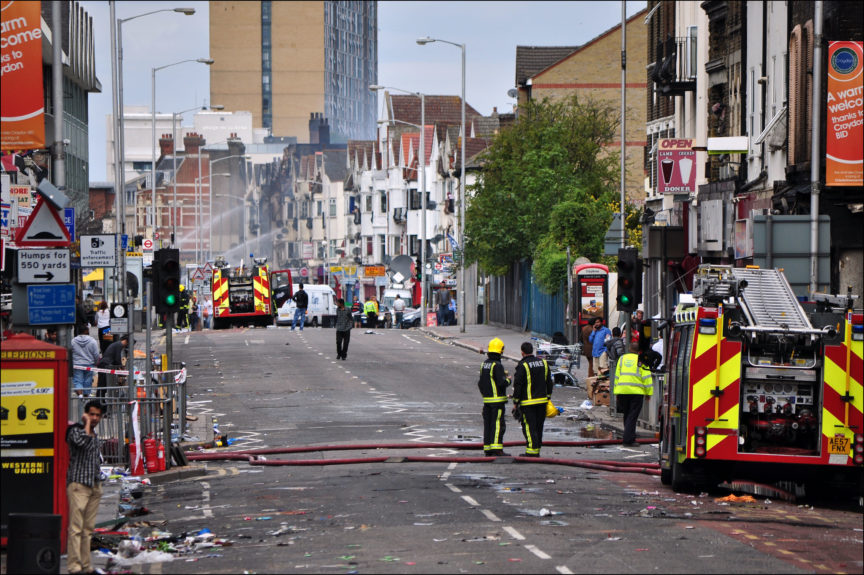
Riots are the explosive culmination of a refusal to endure the violence of political, social and economic systems any longer: they are the unified voice of the disenfranchised proclaiming: things must change; the centre cannot hold.
It’s a voice the public seldom hears, expressed through a medium they seldom try to understand. As the sound of working class anguish, riots are a reality that many people with two feet on the social ladder, would rather deny.
The political expediency of the riot as strategy is not discussed enough. In his recent book Riot, Strike, Riot, Joshua Clover makes strong arguments for why this period of capitalism is well suited to riot as resistance. “Circulation struggles”, he writes, “are rioters confronting capital where it is most vulnerable.” For Clover, the freeway takeover, the runway takeover, are perfect examples of this.
Historically, the riot has gone hand in hand with the strike. The 18th century sailors who first struck the sails of British boats, refusing to work until wages rose and thus birthing the seafaring origin of the term ‘strike’, were also known for their riots and rebellions. The 19th century American labour struggle saw rioting become national in scope; the West Indian Labour unrest of 1934-39; the 1967 Hong Kong riots. The list goes on and on.
As long as there have been strikes – the most powerful weapon of the people in affecting redistribution and justice – there have been riots alongside them. The revolutions in Haiti, America and France, the upending of the Atlantic Slave Trade, all owed part of their possibility to riots and lootings.
Minneapolis to Manila, fighting across borders.
Only solidarity – combative, active solidarity – defeats racism. By this logic, resisting institutional racism and violence against poor black and brown communities – who make up the majority of the world’s population – has to be a shared, borderless struggle, from Delhi to Minnesota. It is vital that we work to understand how such racist violence has and continues to manifest globally.
We were sitting in a big house, probably the biggest house I’ve ever been invited to, with Anita Roddick, the heiress to the Body Shop. Roddick had been working on the release of the Angola Three with Amnesty International. The Angola Three are prisoners turned Black Panthers who each served over 40 years in Louisiana state penitentiary on false charges of murder (of an officer while they were already in prison for lesser crimes) because of their organising.
While they were in London it was arranged for us, as young BLM activists, to meet with two of them: Albert Woodfox and Robert King. Their soft mannerisms and animated way of speaking gave away nothing of the 40 plus years spent largely in 23 hour solitary confinement in America’s largest maximum security penitentiary. The longest period of solitary confinement in American prison history.
The conversations traversed all things resistance, but I remember one very well. At one point, we recounted to King the banal response we’d constantly receive when raising the spectre of racism in Britain: “But at least things are not like in America.”
King nodded along listening and told us writer and activist James Baldwin had a similar predicament when being told that the situation in America doesn’t compare to Apartheid in South Africa. Baldwin would shrug it off, King explained, saying that his comrades in South Africa took no consolation in the American situation, as he didn’t in theirs; that this wasn’t a race to the bottom.
Baldwin understood the importance of comparing struggles and finding solidarities. He would write about it in his Report from Occupied Territory, which details police brutality in 1966 Harlem:
“Harlem is policed like occupied territory… Occupied territory is occupied territory, even though it be found in that New World which the Europeans conquered, and it is axiomatic, in occupied territory, that any act of resistance, even though it be executed by a child, be answered at once, and with the full weight of the occupying forces.”
Police act as occupying forces in poor black and brown neighbourhoods everywhere.
On the afternoon of 11 April, shots rang out into an Arab neighbourhood of Anderlecht, Brussels, allegedly from a pistol stolen only moments before, from police. Rocks flew toward police lines and the riot broke out, police cars were trashed and videos show hundreds of young people from the area spilling out. Over fifty arrests were made.
Days earlier 19-year-old Adil, of Moroccan heritage, was chased down on his scooter by Belgian police for breaching lockdown rules, and killed. In the Philippines at least 30,000 people have been arrested, with the case of Winston Ragos, shot dead for allegedly breaching curfew, further stirring tensions in Manila.
“The other death toll from the coronavirus pandemic” is what writer Eda Seyhan called the deaths of people of colour at the hands of the police in an article for Al Jazeera. Seyhan notes that in Nigeria, three weeks into lockdown, “more people had died at the hands of police enforcing coronavirus restrictions than from the virus itself”. 18 to be exact – and a number that has only risen.
Meanwhile, on 26 May, in the Iyana-Oworo area of Lagos, after a heavy-handed altercation with a bus driver allegedly breaching curfew, a crowd began to form. The police drew their pistols and one officer, who witnesses said was intoxicated, fired warning shots into the crowd.
An eye-witness report for the BBC described how Tina Ezekwe, a 16-year-old shop attendant who sold fruits on the stall nearby, was shot: “Dem shoot my sister, I tell di police man say im don shoot my sister but dem no answer me.” A movement is growing, calling for justice for Tina, who died two days later from the shooting.
Tina’s death eerily echoes the killing that followed a coronavirus curfew in Kenya, in which 13-year-old Yassin Hussein Moyo was shot dead as police attempted to clear out street vendors.
“Yassin told me that he had been hit, & I told him to stop his jokes because he likes to joke a lot. He said, ‘Mama, I am not lying, I have been shot.’ ” Yassin Hussein Moyo, 13, killed at home by a #richochet; Kenyan police enforcing curfew. #covidfallen (photo @luistatophoto) pic.twitter.com/BfIGzm9wNP
— Jeff Sharlet (@JeffSharlet) April 4, 2020
Informal workers, like Ezekwe, who form the majority of the global workforce, whose communities are full of essential workers, are hardest hit not just by coronavirus but also by police brutality – they are first to work, first to die and first to fight. Adil, Ezekwe, Moyo, much like Floyd and Taylor are poor black and brown people, living in poor black and brown communities, who bear the brunt of coronavirus, poor housing, precarious work and the brutality of Baldwin’s “occupying forces”.
When the United Friends and Family Campaign (a coalition of family justice campaigns run by friends and loved ones of those killed in police and state custody in Britain) travelled to America to meet similar campaigns, the solidarity was immense.
Hearing Marcia Rigg, whose brother Sean was murdered by police in Brixton in 2008, speak of those encounters it was clear to me, as it was to her, that all families, regardless of geography, are dealing with the same occupying forces. Rigg spoke of the shock American families showed at the brutality of British police.
There have been over 1,740 deaths in police custody since 1990, and plenty more before that, if we take into account deaths in state custody, including psychiatric wards and prisons. In this context, the figure can grow to over 5000 and include names like Sarah Reed, whose repeated treatment at the hands of police and eventual death is painfully unforgettable. To Reed’s we can add names like Rashan Charles, Edson Da Costa, Darren Cumberbatch, Nuno Cardoso, Joy Gardner, Cherry Groce, Cynthia Jarrett. The occupying forces of London, of Birmingham, of Yorkshire committed these killings.
It is apt to use the word forces, British police – as per the imperial boomerang effect – were modelled on colonial paramilitaries, once used to subdue the ancestors of those very communities they now murder with impunity.
Every time I see this it reminds me how close to home this is and the UK is most definitely not innocent. RIP Uncle Rocky 🙏🏾 https://t.co/pqIpqlPgsZ
— isha (@Ishaa_J) May 9, 2020
Robert Peel, who as Home Secretary installed the Metropolitan Police in 1829, worked for decades before installing the first colonial police force in Northern Ireland in his role as the Irish secretary. Irish and Black American civil rights activists understood this shared history all too well, it’s why Irish hero Bernadette Devlin upon being given the key to New York City by mayor John Lindsay in 1969, promptly handed it to the Black Panther Party, to whom she said it belonged.
This is not an attempt to flatten the very real difference between how, for example, Palestinians or Baloch are treated by occupying forces, it is to say, much like many Baloch and Palestinian fighters have said, we have a common enemy, common experience and common struggle. This is what led Devlin to recall after meeting Angela Davis that “Angela Davis and I are involved in the same struggle… for the liberation of our people”.
This is coming from a country that has been oppressed/at war & have dealt with the same thing everyday even whilst fighting their own battles they’re standing up for others.
THAT IS PALESTINE 🇵🇸#BlackLivesMatter #GeorgeFloyd #جورج_فلوريد #Muslim #Palestine #AllLivesMattter pic.twitter.com/31KReyiNZE— Mohammed Bin Samaydeen (@Moh_Samaydeen) June 5, 2020
Back in London, sellotape lined the edges of a hand-drawn sign, stuck to the driver’s carriage window of a Victoria Line train: “Justice for George Floyd”.
Fred Hampton, an incredible Black Panther who died too young, at the hands of the police no less, left us an instructive mantra: “We’re going to fight racism not with racism, but we’re going to fight with solidarity”. Hampton is right; solidarity is the only way to defeat racism; through global solidarity but also solidarity between working class communities.
Toward Black Liberation.
Despite many within the black community understandably celebrating black economic power, we cannot fall into the trap of trying to play by the rules of a broken capitalist system. It is not enough to reform the political and economic structures that are designed to exploit the lives and labour of millions of black and brown people across the globe. Far from fixing the system; we must dismantle it entirely.
“I’ve had enough of this, I need to leave here.” Days ago my mum was on the phone, her breath heavy with distress. “You know the feeling son… I know you know it very well”. She was referring to the many times I’d been stopped by police. “When they come… when the fear and anger is at your chest but you feel helpless.”
A police truck rolled past the house in the humid afternoon as she sipped tea by the front gate, two young officers stepped out and proceeded to ask my mum why she was standing by the gate. Disbelieving that she could live there, they proceeded to let her know she had two options: get in the truck, or get put in the truck.
The ongoing 60-day coronavirus martial lockdown in Mauritius had already taken its toll. She refused to leave with them, but having seen her Mauritian ID and that they’d frightened her enough, the officers backed off. As we spoke more she shifted the conversation to police brutality in America: “I’m lucky it’s not like over there, but things will change.”
Things will change, and we shall overcome, but that certainty is conditional on two things; black power and people power – those organising in solidarity. Black America, like Black Europe, is fatally divided between the haves and have-nots of those populations. Keeanga-Yamahtta Taylor delineates this issue in her book How We Get Free, explaining how the black elite are held up as “evidence that the United States can deliver the American Dream”.
Celebrities, politicians and so-called progressives are flocking to the pulpit with demands to reform the police or build black economic power bases. To these demands, the second line of Fred Hampton’s above quote is very useful: “We say we’re not going to fight capitalism with black capitalism, but we’re going to fight it with socialism.”
“We’re going to fight racism not with racism, we’re going to fight it with solidarity. We say we’re not going to fight capitalism with Black capitalism, but we’re going to fight it with socialism.” —Fred Hampton pic.twitter.com/0lin1a6ljN
— Haymarket Books (@haymarketbooks) June 2, 2020
Defeating racial capitalism is contingent on the creation of mass movements which aim to dismantle rather than reform the system.
As the Minnesota national guard tested their armouries, preparing for the first deployment in its 164 year history two short speeches were gaining numbers on social media – Killer Mike and Cornel West. I’m sure the two brothers are fond of each other, but it’s telling that in this moment of crisis they took such strikingly different approaches.
Mike, a rapper, actor and activist, makes the popular case to fall back and “plot, plan, strategise, organise, and mobilise”, suggesting “it is time to beat up prosecutors you don’t like at the voting booth”. He goes on: “It is time to hold mayoral offices accountable, chiefs and deputy chiefs… making sure you fill out your Census so that people know who you are and where you are… and going to local elections and beating up the politicians that you don’t like.” In short, play the system at its own game.
West takes a markedly different approach, arguing that “the system cannot reform itself”. As an advisor to Obama himself, West perhaps knows this more than most. Unpacking the backdrop of the rebellion, he suggests that what we’re witnessing is “America as a failed social experiment… that the history of black people for over 200 and some years in America has been looking at America’s failure”.
“The country’s capitalist economy cannot generate and deliver in such a way that people could live lives of decency,” he continues, “the nation-state, its criminal justice system, its legal system could not generate protection of rights and liberties”.
Americans, West explains, face a choice: revolution – the democratic sharing of power, resources and wealth – or bust.
Both West and Mike agree on one point: that we must fight, whether it’s in the ballot box or on the streets.
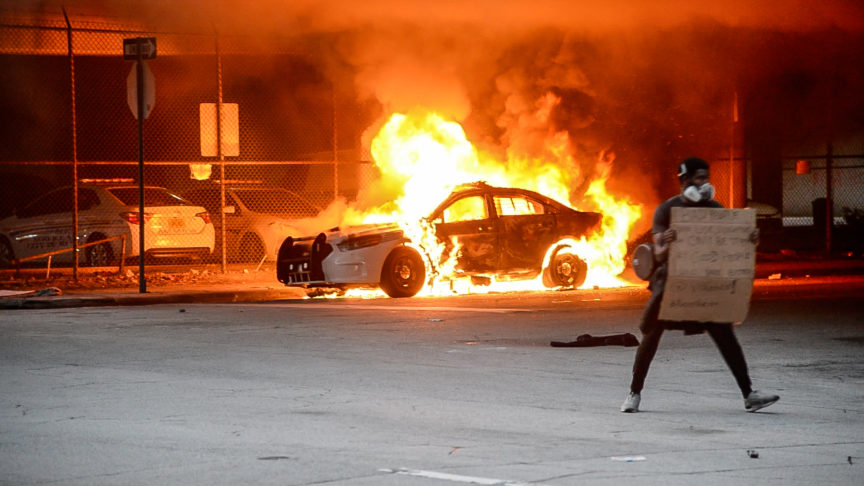
History shows us that rioting and violent protest is often a tactical necessity in bringing about meaningful change. Justice, what every American of decency is crying out for, is born of struggle. Struggle will require, as it always does, that we educate, organise and agitate – and that we do so at the pace within which entire communities can move.
Right now, feet, hearts and minds are on fire, but fire is unsustainable. Struggle calls us home after the fire has burned, to cool down, to sit with mother history and reflect as communities name our goals and plot the trajectory beyond not just the Floyd Rebellion, but through and beyond the global pandemic, by which our communities are hardest hit.
A black American was dragged through the street by police, suffocated and killed. The world watched as he pleaded for life and cried for his mother.
Our hearts are torn as we are summoned to change this cruel reality, but to really honour George Floyd’s passing we must situate his murder within the wider reality of racial capitalism. We must embrace a diversity of tactics, expand our solidarities across borders and build movements from moments – by any means necessary.
Joshua Virasami is an organiser and artist whose forthcoming book ‘How To Change It’ is being released with Penguin’s #Merky Books, curated by Stormzy, on 3 September. You can preorder it here.